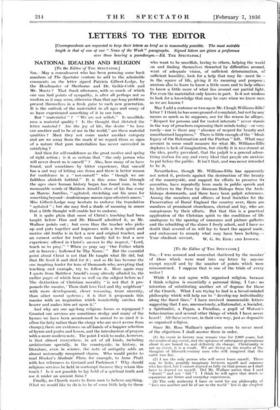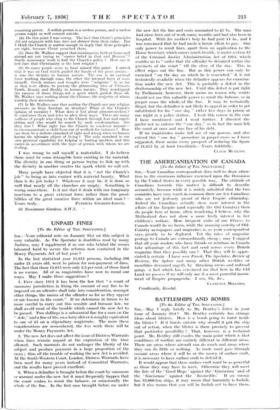SIR, —I was amazed and somewhat shattered by the number
[To the Editor of THE SPECTATOR./ of ideas which were read into my letter by anyone except myself and by the number of points which were
misconstrued. I suppose that is one of the trials of every writer !
While I do not agree with organised religion, because I think religion is essentially a personal thing, I I liV2, no intention of substituting another set of dogmas for those of the Church. What I am trying to find is a broad-minded philosophy which will help me to " develop my individuality along the finest lines." I have received innumerable letters suggesting-that I am, unconsciously, a Rationalist, a Socialist,
a Spiritualist, a Pagan, a Freudian, a pupil of Watson's behaviourism and-several other things of which I have never.
heard ! All these sects'are, in their own-way, just as dogmatic
as organised religion. •
Since Mr. Ross Wallace's questions seem to cover most of the objections I shall answer them in order.
(I) An event in history may remain true for 2,000 years; but the results of any evene, and the opinions of subsequent generations about it, are bound to, and definitely do change. Christianity is not an event, it is a result. We are living on the results of the thoughts of fifteenth-century men who still imagined that the earth was flat.
(2) I am the only person who will never leave myself. There may be links, possibly imaginary between myself and someone who has died, but I cannot depend as fully on that person as I shall have to depend on myself. Did W. Wallace notice that I said " desert " and not fail" P I think he will agree that death or separation are bitter arid everyday experiences.
(3) The only authority I have or need for my philosophy of " love one another. and be of use to 'the world" lies in the simplest
reasoning power. A selfish person is a useless person, and a useless person might as well commit suicide.
(4) On this point I was wrong. The fact that Christ's principles 'did not originate with him does not detract from their value. But I think the Church is narrow enough to imply that those principles
are right, because Christ preached them. •
(5) Does Mr. Wallace suggest that missionaries, both at home and abroad are not trying to "coerce belief in God and Heaven" ? Surely missionary work is half the Church's policy ? How can it feel sure. that Christianity is the best religion ?
(6) So many people seem to have missed this point. I stated that it was no God which guided the hands of the great artists-- it was the divinity in human nature. The one is an external force working through man, the other. the internal force of manhimself. Greek statues and temples were " religions " in so far
as they were efforts to portray the glimmering idea of I7ltimate Truth, Beauty and Reality in human nature. They worshipped the essence of. these things, not a spirit which guided them all. Mr. Wallace says nothing about the Chinese, the majority of whom worship their ancestors.
(7) Is Mr. Wallace sure that neither the Church nor any religion prevents us from freedom to develop ? What of the Church's opinion of morality ? What does it feel about pleasure-seekers ? ft condemns them and tries to alter their ways. There are many millions of people who cling to the Church through fear and super- stition and who would be scared by such condemnation. Are they free ? What right has the Church to condemn anyone— to excommunicate a child born out of wedlock for instance ? How can there be a definite standard of right and wrong when no human knows the ultim'ate object of living ? The only standard is our own personal capability for helping or hurting another, and this varies in accordance with the typo of person with whom we are dealing.
I was wrong to call myself a materialist. I do believe there must be some intangible force existing in the material. The divinity in one thing or person trying to link up with the divinity in another creates the spark which we call art.
Many people have objected that it is " not the Church's job "• to bring us into contact with material beauty. What then is its job today ? Whatever it may be, it is done so well that nearly all the churches arc empty. Something is wrong somewhere. Is it not that it deals with our imaginary reactions to a great external force rather than the possi- bilities of the great creative force within an ideal man ?-
65 Ennismore Gardens, S.W.7.















































 Previous page
Previous page